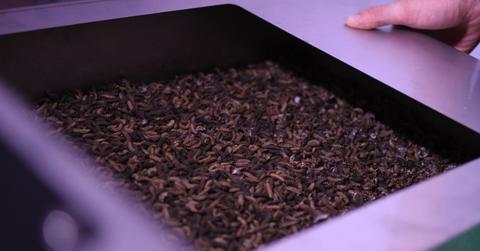Startup Envisions Fly Larvae As A Sustainable Protein Source
Entocycle, a U.K.-based company, is using black soldier fly larvae as a sustainable source of protein for animals, and maybe someday humans, helping to solve one of our planet's biggest issues: food production and the growing population.
Updated May 24 2019, 7:16 p.m. ET
One of the largest future issues our world faces is one of food production. By 2050, the global population will grow 37 percent to 9.7 billion, according to the United Nations, adding many mouths to feed with dwindling resources. Some predict that the cost of growing food will increase by 70 percent by 2030. There are many solutions to this monumental problem – after all, the U.S. wastes around 40 percent of the food it produces – but one startup sees the answer in bugs.
Entocycle, a U.K.-based company, is using black soldier fly larvae as a sustainable source of protein for animals, and maybe someday humans. Raising animals for food is vastly unsustainable. Globally, we use 80 percent of agricultural land for animal production, whether raising the actual animals themselves or growing mono-crops of soy and corn to feed them. Additionally, four million hectares of rainforest are destroyed every year in the process, marine fish stocks have plummeted 50 percent since the 1970s, and factory farming is one of the top emitters of green house gases globally.
For Keiran Olivares Whitaker, founder of Entocycle, there had to be a better way.
“Our mission is to bring a stop to the degradation of our beautiful planet and stop taxing its finite natural resources,” Whitaker told Digital Trends. “For 60-odd years mankind has savaged seas and rainforests in order to farm fish and grow crops to feed to animals for meat... Animals don’t need fishmeal or soy meal to be healthy. We can feed them insects instead — which is many animals’ natural choice in the wild anyway.
Insects are rich in protein, and are much more sustainable to farm, and create just a fraction the amount of greenhouse gases as traditional animals do. And while many have started to make use of crickets, mealworms and locusts, black soldier fly larvae is untapped – and even more sustainable. To raise crickets for protein, for instance, the bugs must eat chicken feed or flour. The fly larvae, however, will eat any waste as food. In this, Entocycle also works to close the vast food waste stream – the company collects organic food waste from various farmers, food processors and wholesalers, providing a greener option for waste and turning it into protein and fertilizer.
On top of that, the insects are vertically farmed and not restricted to floor space or area, meaning they're even more efficient produce than with traditional methods. Entocycle also employs technology, including smart pods, to gather analytics about their insect's development, providing more opportunity for fine-tuning their system, and uses an automated system, allowing them to produce at an industrial scale. This provides farmers a cost-effective and sustainable alternative to typical feed.
For now, Entocycle is just working on feeding animals more sustainably, which in turn feeds humans more sustainably. But with other insect proteins hitting grocery store shelves, Whitaker sees a future for fly larvae in the human diet.
“We have big ambitions and so we would be keen to explore producing insects for the human diet in the future because it just makes so much sense to,” he told Digital Trends. “They are highly nutritious, the black soldier fly doesn’t carry disease, and is a completely sustainable source of food. Once people are over the ‘ick’ factor — which is only really a prevailing attitude in the west — then there is nothing to stop insects becoming part of a person’s regular, healthy diet. It would take a great shift in attitudes and behavior, and I think we would very much one day aim to be a part of that.”
